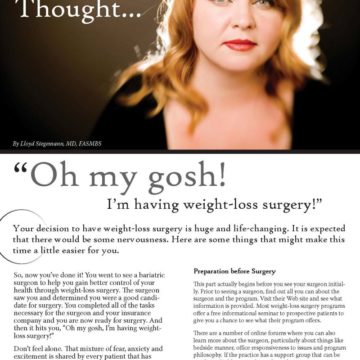Which Vitamins Do I Really Need?


by Jacqueline Jacques, ND
Spring 2010
After weight-loss surgery, one of the things that most people have to adopt as a new habit is taking vitamins every day. While there are general things that might be the same between what your doctor recommends and what another doctor recommends, some things might be different.
When answering the question, “What do I really need to take?,” the first and most important answer is “Take what your doctor recommends.” Somewhere along the way, your bariatric surgeon, or the dietitian in the office, probably gave you a list of the vitamins you needed to take after surgery based on your procedure.
Also, if your doctor looked at your labs, you might have been given some very specific recommendations just for you. Either way, this is where you should start. If you have not seen your bariatric surgeon in many years, it is also wise to call the office and find out what the current recommendations are – knowledge about nutrition has changed a lot in recent years and they might have new recommendations that you were not given.
Generally speaking, taking supplements after surgery is for three reasons:
- To make sure you get adequate vitamins and minerals even though you are eating less food
- To help prevent deficiencies that you are at greater risk for because of your procedure
- In some cases, to treat a nutritional deficiency
The most common types of supplements taken after surgery are multivitamins, calcium, vitamin B12 and iron.
Multivitamins
When you have bariatric surgery, no matter which procedure you have, one primary reason you lose weight is that you eat less. When people eat less, getting the vitamins and minerals they need each and every day is hard to do – the truth is that most people can’t do this even when they can eat as much as they want.
A study done in 2008 followed 210 post-operative patients for two years and compared the nutrition in what they ate to the Dietary Reference Intakes (DRI’s). They found that even though patients tended to eat better after surgery, not one was able to eat even the minimum requirement for Vitamin A, Vitamin C, calcium, iron, B1, B3, B6, Folate, biotin or pantothenic acid (B5) (1).
The kind of multivitamin you need to take may vary by procedure, but most often patients are asked to look for something with 100 percent of the Daily Value (DV) for all the vitamins and the trace minerals. A multivitamin is very unlikely to have the DV for minerals such as calcium, magnesium or potassium. Products calling themselves “complete” may not actually provide all the vitamins and minerals, so carefully read labels.
Calcium
Doctors from the Mayo clinic recently looked at 97 patients from the past 20 years who had bariatric surgery (2). They found that 21 of these patients had suffered a total of 31 fractures – this is more than twice the fracture risk of the general population. Most fractures occurred an average of seven years after surgery, with the primary locations being in the hands and feet. Other sites of fractures were the hip, spine and upper arm.
Bone loss is a risk after all types of bariatric surgery and getting adequate calcium is one important part of helping to prevent bone loss. The American Society for Metabolic and Bariatric Surgery recommended intakes for calcium after bariatric surgery are as follows:
- Adjustable Gastric Band (AGB): 1500mg calcium
- Gastric Bypass (RNY): 1500 to 1800mg calcium as calcium citrate
- Duodenal Switch (DS): 1800 to 2400mg calcium as calcium citrate
Vitamin B12
The stomach is very important for B12 absorption. This is because stomach acid helps to release B12 from food, and another substance that is made by the stomach – Intrinsic Factor –is essential for B12 absorption. Some bariatric surgery procedures, such as gastric bypass and vertical sleeve gastrectomy, make B12 absorption more difficult for these reasons. Often people who have these procedures will be required to take additional B12 as an injection, intranasal spray or sublingual tablet.
Iron
Low iron or iron deficiency anemia can be a complication of bariatric surgery, but is especially common after gastric bypass. Iron levels are harder to maintain after gastric bypass because the primary area where iron is absorbed (the duodenum) is bypassed. Many doctors will recommend that patients take iron preventively to protect against developing a deficiency.
Other Nutrient
Depending on your nutritional labs or on the specific concerns of your programs, you may be asked to take other nutrients. Some common nutrients include Vitamin D, Thiamine (B1) and protein supplements, but there may be others. Again, your doctor’s advice should be primary.
Conclusion
One final piece of advice: if you don’t take your vitamins, they won’t work. Many people become overly concerned about what they should take, but don’t necessarily do a great job at taking the nutrients they need on a daily basis. It’s also not uncommon for people to do a great job taking their vitamins for a year or two after surgery, but they may stop taking them over time. Most nutritional deficiencies are easier to prevent than to treat, and once you have had surgery, your risk for developing a problem never goes away. Sticking with your basic nutritional program will help assure both your health and your success.
100% Daily Values for Common Nutrients
Note: These values do not reflect specific recommendations for weight-loss surgery patients. Patients should talk to their surgeon for recommended vitamin intake.
| Nutrient Vitamin A Vitamin C Vitamin D Vitamin E Vitamin K Vitamin B-1 Vitamin B-2 Niacin Vitamin B-6 Folate Vitamin B-12 Biotin Pantothenic Acid Calcium Iron Phosphorus Iodine Magnesium Zinc Selenium Copper Manganese Chromium Molybdenum Chloride Potassium |
100% Daily Value 5,000 IU 60 mg 400 IU 30 IU 80 mcg 1.5 mg 1.7 mg 20 mg 2 mg 400 mcg 6 mcg 300 mcg 10 mg 1,000 mg 18 mg 1,000 mg 150 mcg 400 mg 15 mg 70 mcg 2 mcg 2 mg 120 mcg 75 mcg 3,400 mg 3,500 mg |
About the Author:
Jacqueline Jacques, ND, is a Naturopathic Doctor with more than a decade of expertise in medical nutrition. She is the Chief Science Officer for Catalina Lifesciences LLC, a company dedicated to providing the best of nutritional care to weight-loss surgery patients. Her greatest love is empowering patients to better their own health. Dr. Jacques is a member of the OAC National Board of Directors.
by Sarah Muntel, RD Spring 2024 Spring has sprung, bringing sunnier and warmer days! For many, this…
Read ArticleWith the holidays behind us and 2022 now here, many of us are ready to tackle our…
View Videoby Kristen Smith, MS, RDN Winter 2022 When you decide to change your dietary habits, it can…
Read Article









